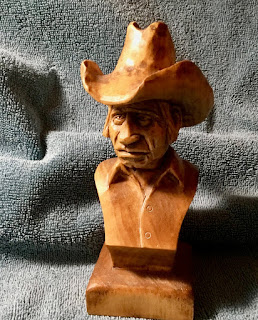 The sight of a large train of empty wagons snaking across the prairie stays with a person. But maybe the sounds it makes leaves the bigger impression. Whips snapping, skinners cursing, steers bawling, chains rattling, and the dull thud of wheels dropping into badger holes all add to the clamor and disorder of the scene. Sometimes aligned in single file, sometimes two abreast, we needed to roll with a steady pace to cover distance with the plodding oxen.
The sight of a large train of empty wagons snaking across the prairie stays with a person. But maybe the sounds it makes leaves the bigger impression. Whips snapping, skinners cursing, steers bawling, chains rattling, and the dull thud of wheels dropping into badger holes all add to the clamor and disorder of the scene. Sometimes aligned in single file, sometimes two abreast, we needed to roll with a steady pace to cover distance with the plodding oxen.
For some reason, the outfit’s owner, Stevenson, didn’t come on this trip. On other trips he could be seen in his light buggy running back and forth along our line or driving on up ahead to check on the route. But for this trip he named Abel Finney his wagon boss, someone who none of us took a cotton to. We called him “Un-Able” because he always seemed to act recklessly without thinking much. But he’s the one giving the orders that we had to follow, and our suspicions of him were to prove correct.
Everyone had ready access to a rifle since the threat of an Indian attack accompanied us all day, every day, even visiting us in our dreams. The news had reached us of the so-called Wagon Box Fight that occurred a short while ago where a couple dozen soldiers were attacked by hundreds of Lakota in Wyoming. Most of the surrounded survived, but only because they possessed lever-action Winchester rifles and had really poured the lead into the Indians who shot mostly bows and arrows. No one with us had that kind of firearm, but this crew was a rugged, lusty bunch that could take plenty of punishment and hand it back.
Pigeon Point was our overnight destination on the way back to St. Cloud, and we would’ve had the choice of two trails to get there. For some reason “Un-Able” steered us to the longer route called the High Water Trail. On it, we’d have to go round the big bend of the Sheyenne River going past Okiedan Butte. That caused some grumbling because it would take longer, but we soldiered on. We had plenty of time now to get lost in our own thoughts, and I called to mind one of the soldiers grabbing an old St. Cloud newspaper rolled up and stuck in the side of my wagon box. His eyes settled on an article headlined “Impeachment.” It was something about President Johnson catching guff for reckless violation of the Constitution and they wanted to throw him out of office. I wonder what happened.
The light rain a few days ago had frozen on the prairie and turned to a crusted glaze that glittered in the sun. The countryside rolled away on gentle hills and made for easy going. We saw lots of wildlife; maybe some venison would find its way into our cooking pots. But now something captured our attention. That dark bank of clouds rising from the western horizon became more threatening and what was a gentle breeze began to blow harder. The temperature started dropping and any of us who’d been on the prairie before when a blizzard blew up became very concerned we’d be caught without shelter.
Un-Able didn’t seem to notice, and since he seemed to be in such a sour mood from making a lousy choice of route, no one approached him. We kept rolling along in our southeasterly direction to get around the big bend of the river. Soon we had no choice but to stop.
Next chapter - Stalled








